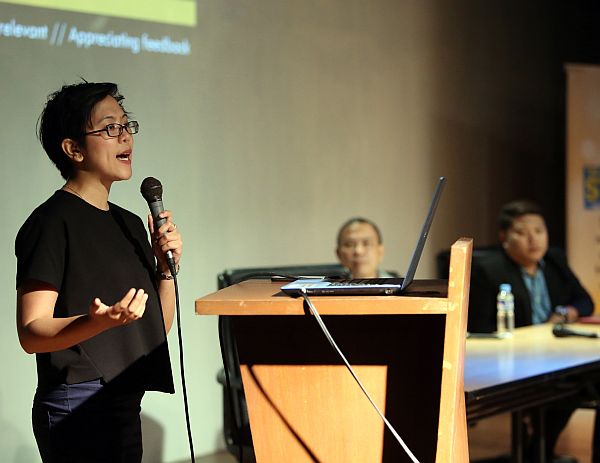
Anadel Camille Diola, editor in chief of Philstar.com, challenges journalists and journalism students to work to restore the trust of the public to the media as a way to fight fake news. Diola was one of the speakers of Journalism and Blogging in the Age of Fake News forum at the Marcelo Fernan Cebu Press Center, which is part of the activities of the Cebu Press Freedom Week celebration.
CDN PHOTO/LITO TECSON)
Top journalists share insights on how to fight fake news
The solution to countering fake news is to do better in journalism.
This is the challenge Anadel Camille Diola, editor-in-chief of Philstar.com, to journalists and journalism students in a forum on Journalism and Blogging in the Age of Fake News, which is part of the activities of the Cebu Press Freedom Week celebration.
“The solution to fake news is to do better in journalism. It strengthens institutions and builds trust,” said Diola, who emphasized that it is the time to restore the trust of the people to the media.
“What fuels fake news is that the public does not trust in journalism as much as before, anymore,” she said.
“We have to reboot. We go back on why journalism is important,” she said.
A way to do this is for journalists to use technology and bring it back to their side.
“Technology is your friend and enemy sometimes. We have to use technology and put it in our side,” she said.
Verifying news information before sharing it is an example of using technology wisely.
“The problem is that you already shared fake news before you checked it,” Diola said.
She also said that mainstream media should also be able to find its audience, improve its craft and adopt to social media to survive.
As for the readers, she also encouraged them to criticize journalists whenever they become irresponsible in doing their jobs.
But she also sought their help to continue to fight fake news by simply not subscribing or not patronizing them.
To the millennials, who are very much exposed to the internet, she said that they could spot fake news by reading real news — getting used to its tone, approach and just being familiar with the issues.
Ethelbert Ouano, legal adviser of Cebu Bloggers Society, emphasized the danger of sharing unverified reports during the forum.
“The problem with fake news is that there is no publisher,” said Ouano, who is also a professor of the University of San Jose-Recoletos School of Law.
He said that not only are you spreading the lie but you are also enriching the liar in the process.
He said that more people are interested in creating fake news websites because these could give them an opportunity to earn money, and it has a high demand.
“The main legal recourse among victims is defamation lawsuit,” he said.
He also encouraged students to avoid fake news, to visit a reputable source, to do some research on the issues, report fake news and defend the truth.
Jon Joaquin, editorial director of mindanation.com and one of the speakers of the forum, said fake news could be in any form.
“Fake news is carried, not just by trolls. It can also be fake labels or unfair labels that are attached to supposedly mga maayos na media agencies,” Joaquin said.
“It is our responsibility to cover fake news with real news,” he said.
He encouraged millennials not to simply click and share news information online.
“We have to trust that you will be educated enough to know the difference between real news and fake news,” he said.
Joaquin encouraged millennials to question everything and not to remain silent.
“Millennials have the opportunity to be heard. Use it,” he said.
“We are after all the public’s teacher,” Diola added.
The forum was attended by students of different schools in Cebu and was hosted by The Philippine Star Media Group, on Tuesday.